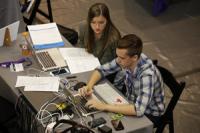-
Foreign graduate students, postdocs consider leaving the U.S.

On 6 March, President Donald Trump signed a second executive order to suspend immigration from six predominately Muslim countries, this time excluding Iraq from the list. According to an article in Chemical & Engineering News (C&EN), the weekly newsmagazine of the American Chemical Society, the move has prompted foreign graduate students and postdoctoral researchers currently in the United States to start looking elsewhere for educational, training and job opportunities.
-
-
Examining susceptibility to cyberattacks through brain activity, eye gaze
New research examines internet users’ susceptibility and ability to detect cybercriminal attacks by analyzing a user’s brain activity and eye gaze while they are performing security related tasks. “Keeping computer systems and networks secure often relies upon the decisions and actions of those using the system,” one researcher says. “Therefore, it is vital to understand users’ performance and behavior when an attack such as phishing or malware occurs. The analysis of neural activations depicts the users’ decision-making capacities, attention and comprehension of the security tasks.”
-
-
Cybersecurity degree approved for Kennesaw State
The cybersecurity field in the U.S. will need an additional 1.5 million workers by the year 2020. The Board of Regents of the University System of Georgia on Tuesday approved an online Bachelor of Science in Cybersecurity at Kennesaw State University. The cybersecurity major includes elements of information technology, information security and assurance, and criminal justice, giving students a combination of technical knowledge and information security management skills.
-
-
Increasing awareness of engineering technology as a field of study, employment
In 2014, there were nearly 94,000 four-year engineering degrees, nearly 18,000 four-year ET degrees, and more than 34,000 two-year ET degrees awarded in the United States. While workers in the engineering technology (ET) field play an important role in supporting U.S. technical infrastructure and the country’s capacity for innovation, there is little awareness of ET as a field of study or category of employment in the U.S., says a new report from the National Academy of Engineering.
-
-
Applied intelligence: Providing actionable insights to decision-makers
Frederic Lemieux is Professor and Faculty Director at the Applied Intelligence Program, School of Continuing Studies, Georgetown University. Georgetown University’s Master of Professional Studies (MPS) in Applied Intelligence, blending study and hands-on practice, is designed for professionals who are looking to enter into or advance within a wide range of intelligence-related roles in both the public and private sectors. Students learn how to master strategies for assessing organizational strengths and weaknesses, harnessing large and disparate datasets, and forecasting business competitiveness in both public and private institutions.
-
-
How Florida is helping train the next generation of cybersecurity professionals

Our increasingly connected and digital world is vulnerable to attack and needs more skilled professionals who know how to defend it. As connected devices proliferate, particularly smart devices creating what has been called the “Internet of Things,” the problem is getting worse. While we don’t know where and when the next cyber threats will arise, we can be sure that our society’s use of and demand for digital connections will only grow. As a result, we’ll also see the demand for cybersecurity professionals rise – and the opportunities for new ways of thinking, learning and collaborating.
-
-
Center for Long-Term Cybersecurity unveils 2017 research grantees
The Center for Long-Term Cybersecurity (CLTC) has announce the recipients of its 2017 research grants. In total, twenty-seven different groups of researchers will share a total of nearly $1 million in funding. CLTC says that the projects span a wide range of topics related to cybersecurity, including new methods for making crypto-currencies more secure; protecting health information stored on mobile devices; teaching high-school computer science students how to “program for privacy”; and exploring potential limits on the use of digital controls in nuclear reactors.
-
-
Stopping human-made droughts and floods before they start
Alberta’s rivers are a main source of water for irrigated agriculture in Canada’s Prairie provinces. But climate change and increased human interference mean that the flow of these headwaters is under threat. This could have major implications for Canadian gross domestic product, and even global food security.
-
-
School shootings in U.S. linked to increased unemployment
A rigorous new study of a quarter-century of data has found that economic insecurity is related to the rate of gun violence at K-12 and postsecondary schools in the United States. When it becomes more difficult for people coming out of school to find jobs, the rate of gun violence at schools increases.
-
-
UAlbany names dean of Homeland Security College
The University at Albany has appointed Robert Griffin as its new dean for the College of Emergency Preparedness, Homeland Security and Cybersecurity (CEHC). CEHC was created under the leadership of Gov. Andrew M. Cuomo in 2015, as the first of its kind in the nation. The college is dedicated to advancing educational and practical skills needed to prepare for, protect against, respond to, and recover from a growing array of natural and human-caused risks and threats in New York State and around the world.
-
-
NSA/DHS endorse DCC cybersecurity program
Virginia Governor Terry McAuliffe on last week praised Danville Community College for becoming the “first rural community college in Virginia” to earn a prestigious cybersecurity designation from the National Security Agency (NSA) and the Department of Homeland Security (DHS). DCC is now one of just four community colleges in Virginia to achieve this milestone, which the governor called “a very big deal” for both attracting new industry and securing digital information.
-
-
Canadian Institute for Cybersecurity launched
The worldwide cybersecurity market is large and growing, with market sizing estimates ranging from $75 billion in 2015 to $170 billion by 2020. The size of the market is a response to the rising global cost of cyberattacks, which is expected to grow to $2.1 trillion by 2020. The Canadian Institute for Cybersecurity, aiming to be a hub for research, training, and industry collaboration, opened at the University of New Brunswick on Monday with more than $4.5 million in funding and the establishment of a research partnership with IBM.
-
-
NSF awards $61 million to enhance understanding of STEM education, workforce development
The National Science Foundation (NSF) has invested $61 million in new awards in order to continue to achieve nationwide excellence in science, technology, engineering, and mathematics (STEM) education and workforce development. The awards focus on projects that help the educational community understand, explain, and address challenges in STEM learning and participation.
-
-
Abbott vows to cut funding for "sanctuary campus" schools
Rebuking a growing movement aimed at protecting undocumented students under incoming President Donald Trump, Gov. Greg Abbott vowed Thursday to cut funding for any Texas school that declares itself a “sanctuary campus.” The definition of a “sanctuary campus” is murky, but Abbott made it clear they are not welcome in Texas.
-
-
Water resources for developing countries
Water experts believe by 2050 almost half of the world’s population will live in countries with a chronic water shortage. The shortfall is the result of population growth, which leads to a greater demand for food, increased pollution, and climate instability. At the Ben-Gurion University of the Negev’s (BGU)’s Zuckerberg Institute for Water Research, eighty scientists and 250 graduate students are working on ways to tackle the problem using cutting-edge science in partnership with academics around the world.
-
- All
- Regional
- Water
- Biometrics
- Borders/Immig
- Business
- Cybersecurity
- Detection
- Disasters
- Government
- Infrastructure
- International
- Public health
- Public Safety
- Communication interoperabillity
- Emergency services
- Emergency medical services
- Fire
- First response
- IEDs
- Law Enforcement
- Law Enforcement Technology
- Military technology
- Nonlethal weapons
- Nuclear weapons
- Personal protection equipment
- Police
- Notification /alert systems
- Situational awareness
- Weapons systems
- Sci-Tech
- Sector Reports
- Surveillance
- Transportation
Advertising & Marketing: advertise@newswirepubs.com
Editorial: editor@newswirepubs.com
General: info@newswirepubs.com
2010-2011 © News Wire Publications, LLC News Wire Publications, LLC
220 Old Country Road | Suite 200 | Mineola | New York | 11501
Permissions and Policies
Editorial: editor@newswirepubs.com
General: info@newswirepubs.com
2010-2011 © News Wire Publications, LLC News Wire Publications, LLC
220 Old Country Road | Suite 200 | Mineola | New York | 11501
Permissions and Policies
